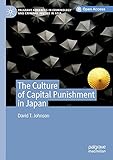The Culture of Capital Punishment in Japan [electronic resource] / by David T. Johnson.
Material type: TextSeries: Palgrave Advances in Criminology and Criminal Justice in AsiaPublisher: Cham : Springer International Publishing : Imprint: Palgrave Pivot, 2020Edition: 1st ed. 2020Description: XV, 125 p. 3 illus. online resourceContent type:
TextSeries: Palgrave Advances in Criminology and Criminal Justice in AsiaPublisher: Cham : Springer International Publishing : Imprint: Palgrave Pivot, 2020Edition: 1st ed. 2020Description: XV, 125 p. 3 illus. online resourceContent type: - text
- computer
- online resource
- 9783030320867
- 364.095 23
- HV6001-7220.5
1. Why Does Japan Retain Capital Punishment? -- 2.Is Death Different? Two Ways Law Can Fail -- 3. When the State Kills in Secret -- 4. Wrongful Convictions and the Culture of Denial in Japan -- 5. Capital Punishment and Lay Participation in Japan -- 6. The Death Penalty and Democracy.
Open Access
This open access book provides a comparative perspective on capital punishment in Japan and the United States. Alongside the US, Japan is one of only a few developed democracies in the world which retains capital punishment and continues to carry out executions on a regular basis. There are some similarities between the two systems of capital punishment but there are also many striking differences. These include differences in capital jurisprudence, execution method, the nature and extent of secrecy surrounding death penalty deliberations and executions, institutional capacities to prevent and discover wrongful convictions, orientations to lay participation and to victim participation, and orientations to “democracy” and governance. Johnson also explores several fundamental issues about the ultimate criminal penalty, such as the proper role of citizen preferences in governing a system of punishment and the relevance of the feelings of victims and survivors.
There are no comments on this title.


